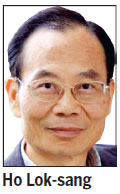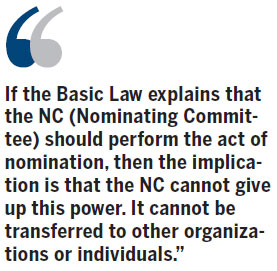Civil nomination clearly violates the Basic Law
Updated: 2014-07-08 06:36
By Ho Lok-sang(HK Edition)
|
|||||||||
Legislator Emily Lau wants to know why civil nomination violates the Basic Law. Legislator Alan Leong, SC, a former chairman of Hong Kong Bar Association, also says Article 45 of the Basic Law does not rule out civil nomination.
Leong cites Article 45, which says: "The method for selecting the Chief Executive shall be specified in the light of the actual situation in the Hong Kong Special Administrative Region and in accordance with the principle of gradual and orderly progress.
"The ultimate aim is the selection of the Chief Executive by universal suffrage upon nomination by a broadly representative Nominating Committee (NC) in accordance with democratic procedures." Leong argues that if the phrase "in accordance with democratic procedures" is liberally interpreted it could allow for civic nomination.
I was on the same TV forum with Leong discussing this issue after the July 1 rally. I challenged him. I told Leong that the phrase "nomination by a broadly representative Nominating Committee" clearly spells out that it is the NC that performs the act of nomination. The phrase "in accordance with democratic procedures" only explains how the NC will perform this role.

If the Basic Law explains that the NC should perform the act of nomination, then the implication is that the NC cannot give up this power. It cannot be transferred to other organizations or individuals.
Civil nomination, however, means any citizen can perform this act of nomination. But if a citizen does not belong to the NC how can he or she have this authority? Because the NC is explicitly given this authority by the Basic Law, only members of the NC can participate in nominating a CE candidate.
The Basic Law does not spell out exactly how the NC is to be formed. So it is legally feasible to form the NC in a way that can claim to be broadly representative. It is also legally feasible to define the meaning of "in accordance with democratic procedures" so aspiring CE candidates with different political backgrounds stand an equal chance of being nominated.
Just as pan-democrat legislators stretch the interpretation of the Basic Law, they also stretch the interpretation of the meaning of "Love the Country and Love Hong Kong". But no one ever said that "Loving the Country and Loving Hong Kong" had to be defined according to any particular official. Under the normal use of this language, "Loving the Country" means acting, thinking, and speaking in ways that will benefit the country rather than hurting it; "Loving Hong Kong" means acting, thinking, and speaking in ways that will benefit Hong Kong. Why should anyone try to stretch or expand this meaning?

"Stretching" an interpretation of the Basic Law shows that the pan-democrats may actually be biased in their views. They may also have been misled.
Hong Kong people should realize that they are protected under the "One Country, Two Systems" framework. Messages being spread on social media arguing that the recent white paper will lead to further restrictions on Hong Kong people's rights are false. Several officials from the SAR government and the central government have confirmed that there will be no further restrictions placed on the authority of the SAR government. If we in Hong Kong want to maintain the high degree of autonomy which we enjoy, we should treat the Basic Law with more respect.
People must also remember that the Basic Law was enacted in accordance with the provisions of the Constitution. I agree with the views recently expressed by China Daily columnist and legal expert Song Sio-chong. He argued that the Constitution is even more important than the Basic Law. The Constitution also makes it very clear that we are subject to Hong Kong's own laws as well as to the Basic Law. In this sense, the Basic Law is like a mini-constitution for Hong Kong. Therefore, all other laws in Hong Kong must give precedence to the Basic Law should there be any sort of conflict.
The author is director of the Center for Public Policy Studies at Lingnan University.
(HK Edition 07/08/2014 page9)